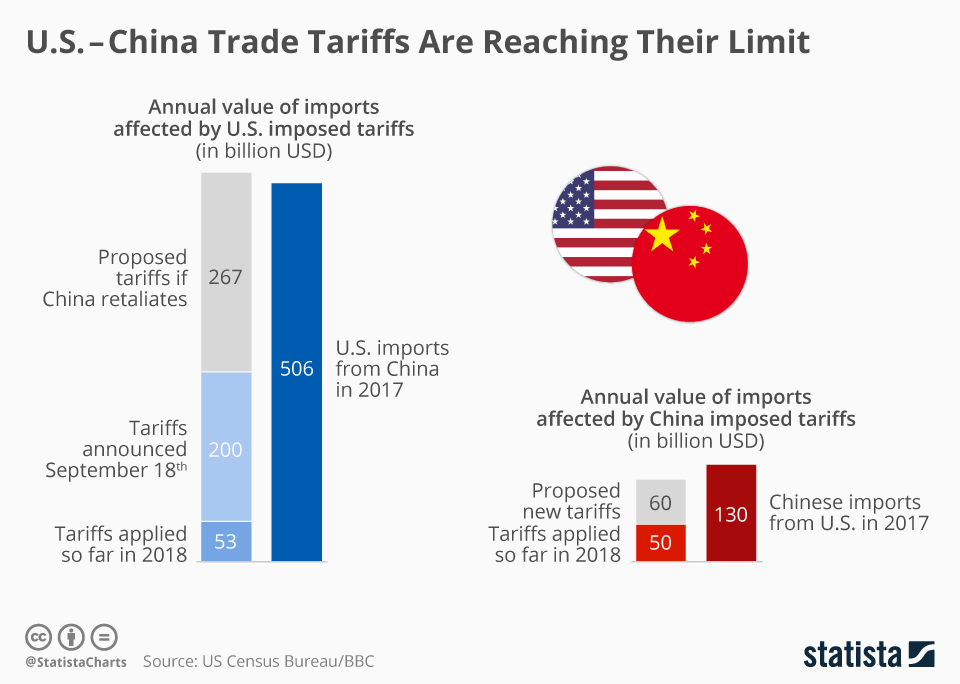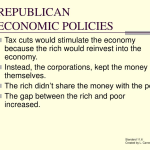China tariffs have become a hot-button issue in recent U.S. trade policy discussions, particularly following statements by the recent president regarding hefty levies on Chinese imports. As tensions in US-China trade relations escalate, the potential impact of tariffs on the economy looms large, raising concerns for consumers and businesses alike. Economists warn that these tariffs could lead to significant supply chain disruptions, driving up prices for goods in the U.S. Moreover, the proposed 2024 tariffs may not only affect China’s economy but could also alter existing alliances, as countries respond to these sweeping measures. Understanding the implications of China tariffs is crucial, as they could reshape the economic landscape and diplomatic relations for years to come.
The imposition of tariffs on products from China represents a significant shift in trade dynamics, highlighting the ongoing tensions between the U.S. and its trading partners. Analysts are examining how these trade barriers might influence economic stability, particularly regarding the broader ramifications for international supply networks. Observers have noted the potential for escalating costs to American consumers, as the ripple effects of such measures become evident across various industries. As discussions around enhanced tariffs for 2024 commence, the ramifications for China’s economic outlook are a growing concern, alongside how other nations might position themselves amidst these changes. Exploring the ramifications of new trade policies offers insight into a rapidly evolving global economic framework.
The Impact of China Tariffs on U.S. Consumers
The proposed imposition of tariffs on Chinese goods is poised to significantly affect American consumers at multiple levels. As economists have projected, implementing a 60 percent tariff would inherently lead to escalated prices on a wide range of consumer products that are currently imported from China. This price hike would not only burden U.S. households but could also trigger inflation, as the cost of manufacturing domestically would rise due to increased material costs. Key goods like electronics, clothing, and household items are likely to see substantial increases in prices, directly impacting consumer purchasing power and lifestyle.
Moreover, such trade policies may also lead to a ripple effect across the economy. Businesses facing higher input costs may resort to cutting jobs or reducing their operations, leading to potential labor shortages, especially in sectors reliant on Chinese imports. The dilemma between protecting domestic manufacturing and maintaining affordability for consumers underscores the delicate balance policymakers must find to navigate the complexities of U.S.-China trade relations. Thus, while tariffs are suggested as a means to bolster domestic industries, they may inadvertently stifle economic growth by curbing consumer expenditure.
Supply Chain Disruptions and Their Economic Implications
The introduction of heavy tariffs on Chinese imports poses significant threats to the already precarious supply chains that many U.S. companies depend on. With Chinese manufacturers providing a substantial portion of raw materials and finished goods, a marked increase in tariffs could lead to immediate disruptions in supply chains. Companies may struggle to source essential components, leading to production delays and increased operational costs. Industries, particularly those in electronics and automotive sectors, that heavily rely on Chinese imports may find themselves in situations where they are unable to meet consumer demand, ultimately affecting their profitability and market share.
Furthermore, as companies scramble to adapt, there is the potential for a notable increase in prices across the board, exacerbating inflationary pressures within the U.S. economy. Supply chain resilience has become a talking point, with businesses considering diversification strategies to mitigate risks. This means sourcing products from other countries, such as Vietnam or India, however, such adjustments come with their own set of challenges including varying standards of quality and the time required to establish new relationships and logistics. Thus, while shifting supply chains may provide a temporary solution, the broader impact on the economy could still be detrimental.
2024 Tariffs: Predictions and Preparations
Looking ahead to 2024, the anticipation of further tariffs on imports from China is causing alarm among economists and businesses alike. The declared intentions of President-elect Trump to enforce an additional 10 percent tariff on Chinese goods raises questions about how this fiscal policy will affect trade dynamics globally. Analysts fear that this could trigger a renewed trade war, which would further strain U.S.-China relations and have sweeping implications for global supply chains. Companies are bracing for potential rollbacks in trade agreements and exploring various contingency plans to safeguard their operations.
As Chinese producers and U.S. importers scramble to devise strategies in response to these potential tariffs, many are investing in alternative markets. China, in particular, has commenced preparations by focusing on strengthening trade ties with countries that could substitute their lost exports to the U.S., notably within the European Union and Southeast Asia. This approach is seen as a safeguard not only against the impending tariffs but also as a way to bolster China’s economy amid ongoing trade tensions. Thus, while tariffs signal a tactical maneuver in foreign policy, their ramifications extend well into economic forecasts and market stability.
China’s Economic Resilience amid Trade Challenges
Despite facing significant pressures from proposed U.S. tariffs, the resilience of the Chinese economy cannot be underestimated. Recent trends indicate that while tariffs may complicate China’s access to the U.S. market, the nation has been diversifying its economic partnerships. China has made strategic investments in emerging markets, focusing on economic corridors that enhance trade outside traditional parameters. This transition, supported by initiatives like the Belt and Road Initiative, aims to mitigate the impact of dwindling exports to the U.S. and maintain China’s economic viability.
Furthermore, Chinese policymakers have been proactive in addressing internal economic challenges through fiscal stimulus aimed at invigorating domestic consumption. This strategy, while ambitious, seeks to rebalance the economy by reducing dependence on exports. As the internal market expands, China positions itself to buffer the adverse effects of external pressures. Hence, the upcoming tariffs may indeed create friction, but they also offer China a chance to recalibrate its economic strategy and boost its domestic market.
Strategic Alliances: A New Global Trade Landscape
The potential for U.S. tariffs to inadvertently foster stronger alliances between China and other nations represents a significant shift in the global trade landscape. China is poised to leverage these dynamics to build a coalition with other economies that may also be negatively affected by U.S. trade policies. This coalition could revolve around collaborative trade agreements that counterbalance the tariffs imposed by the U.S., thereby offering mutual benefits and fostering economic growth across these nations. Countries such as Australia, the U.K., and those in the EU may find common ground with Chinese interests, reshaping traditional alliances.
Furthermore, discussions about multilateral trade initiatives may gain traction as countries seek to insulate themselves from unilateral tariff actions. This scenario highlights the delicate balance the U.S. must maintain to avoid alienating allies in its trade strategy, potentially leading to a reevaluation of current economic ties. The very policies intended to strengthen U.S. economic dominance could, paradoxically, facilitate a more unified position among nations seeking alternatives in trade partnerships. This reconfiguration could redefine the essence of global trade relations and the interplay between economic powerhouses.
Implications for Labor Markets in the U.S.
The projected tariffs on Chinese imports are expected to have profound implications for labor markets within the United States. As businesses grapple with the impact of increased costs, particularly in manufacturing sectors that depend on affordable imports, the likelihood of job loss amplifies. Companies may opt to downsize or relocate operations to reduce expenses, affecting employment levels across various industries. The complex interplay between labor needs and trade policy functions as a significant area of concern, as workers are directly impacted by these trade shifts.
On the other hand, while some sectors may witness job reductions, tariffs may also spur growth in domestic manufacturing as companies attempt to pivot towards local production solutions. This shift could generate new job opportunities, albeit with a lag in time. The debate around tariffs thus encapsulates not just economic theory but profound social implications, necessitating a multifaceted approach to labor policies. Understanding and preparing for these changes is critical for safeguarding workers while navigating the tumultuous waters of U.S.-China trade relations.
Unintended Consequences of Tariffs on American Innovation
While tariffs are often viewed as a means to protect domestic industries, their broader implications may hinder American innovation. The imposition of high tariffs on Chinese goods could result in increased costs for essential components used in advanced manufacturing and technology. Industries that rely on cutting-edge technology may find their operating costs soaring, leading to potential cuts in research and development investments. This development could stagnate growth in sectors critical to the U.S. economy.
Moreover, the retaliatory nature of tariffs may provoke China to impose its own restrictions on U.S. technology exports, further stifling innovation. With both countries navigating through economic tension, the collaboration that fuels technological advancement may suffer. This shrinking of collaborative innovation exposes a significant vulnerability in U.S. competitiveness in global markets, particularly as other nations increase their investments in technology and innovation. Thus, the prospect of tariffs ultimately casts a shadow over the long-term economic growth potential of the U.S.
Navigating Geopolitical Tensions through Trade Policy
Navigating the intricate relationship between trade and geopolitics presents a formidable challenge for policymakers as tariffs on China unfold. As the U.S. considers the imposition of tariffs, it risks not only economic repercussions but also geopolitical ramifications that could redefine international relations. The prospect of increased tariffs could strain not only the U.S.-China relationship but also impact global alliances, pushing traditional partners to reassess their economic ties in the wake of trade hostilities. This dynamic compels a nuanced understanding of the interconnectedness of economic policies and diplomatic relations.
Consequently, policymakers must weigh the immediate benefits of tariffs against the potential long-term consequences on global partnerships. Strengthening ties with allies often involves collaborative trade relationships; however, protectionist measures could drive a wedge between the U.S. and countries that stand to benefit from free trade. In a globalized economy, the far-reaching impacts of seemingly unilateral decisions raise essential questions about the best path forward in maintaining robust geopolitical alliances while promoting domestic economic interests.
Frequently Asked Questions
What are the potential impacts of China tariffs on the US-China trade relations?
The imposition of China tariffs can significantly strain US-China trade relations, leading to increased tensions and retaliatory measures. As tariffs make goods more expensive, both economies could face slower growth, and the U.S. might experience higher prices on consumer products, which could, in turn, disrupt the supply chain.
How do China tariffs affect the economy of both the U.S. and China?
China tariffs can have dual impacts on the economies of both nations. For the U.S., they can lead to increased prices for consumers and potential shortages in various products due to disrupted supply chains. For China, tariffs could hinder export growth, leading to economic instability and increased pressure to adapt its trade strategies.
What is the expected impact of 2024 tariffs on Chinese exports?
The expected 2024 tariffs could significantly reduce Chinese exports to the U.S., potentially decreasing demand for Chinese goods, which are crucial for its economy. Such tariffs could lead to an intensified focus on alternative markets for China, but the immediate effect would likely be economic challenges domestically and internationally.
What implications do China tariffs have on the global supply chain?
China tariffs can disrupt the global supply chain by increasing manufacturing costs and leading to delays. As manufacturers seek to avoid tariffs, they might shift operations or suppliers to other countries, which could create uncertainty in supply chain logistics and increase dependency on less developed markets.
How might China respond to the potential for increased tariffs in U.S. trade policy?
China may respond to increased tariffs through diplomatic negotiations emphasizing cooperation with other nations impacted by U.S. tariffs. Additionally, Beijing might implement domestic policies to stimulate its economy and seek to enhance trade relations with alternative markets like Europe and Southeast Asia.
| Key Points | Details |
|---|---|
| Trump’s Proposed Tariffs on China | President Trump plans to impose a 10-60% tariff on Chinese goods upon taking office, claiming it will combat illegal migrations and drug issues. |
| Potential Consequences for U.S. Economy | Economic experts warn of higher prices, supply chain disruptions, and labor shortages impacting American consumers. |
| China’s Economic Context | China’s economy is currently struggling with a faltering housing market and sluggish consumer demand, making tariffs more damaging. |
| China’s Export Challenges | Tariffs would complicate China’s established export strategies into crucial U.S. markets, promoting a need for new trade negotiations. |
| Impact on U.S.-China Relations | Tariffs could strengthen Beijing’s ties with traditional U.S. allies in Europe, Australia, and Japan, potentially isolating the U.S. |
| Alternative Markets for China | China is exploring new markets through initiatives like the Belt and Road, but these are not immediate substitutes for the U.S. market. |
| Preparedness for Tariffs | China has been strategizing for the likelihood of new tariffs, although their response remains uncertain amid domestic economic pressures. |
| Effects on Other Suppliers | Countries like India and Vietnam may be positioned to fill voids left by China but need time to improve supply chain capabilities. |
| Potential for EU-China Cooperation | Tariffs could inadvertently enhance cooperation between China and the EU against U.S. trade policies, reshaping global alliances. |
Summary
China tariffs are poised to have wide-ranging impacts on both the U.S. and Chinese economies, inciting fears of price increases, supply chain issues, and disruptions in diplomatic relations. As President Trump prepares to implement these tariffs, economists caution about the potential backfire effects that could further complicate U.S. reliance on Chinese imports while enabling China to strengthen ties with other nations. The situation calls for careful navigation to avoid unintended consequences that may impede U.S. economic stability and foreign relations moving forward.


